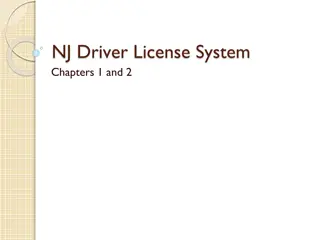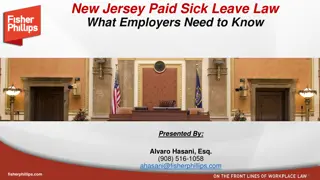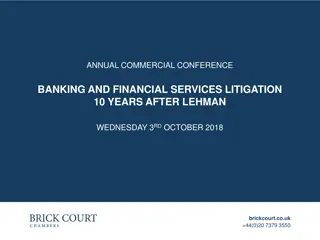The New Jersey Oppressed Shareholder Statute
The New Jersey Oppressed Shareholder Statute, N.J.S.A. 14A:12-7, outlines the grounds for oppression in a corporation and the process for a buyout. It allows the Superior Court to appoint a custodian, provisional director, order stock sale, or dissolve the company. Key provisions include shareholder voting division, director succession issues, and compensation for appointed officials. The statute also covers determining fair value for share buyouts and sets timelines for payment.
Download Presentation

Please find below an Image/Link to download the presentation.
The content on the website is provided AS IS for your information and personal use only. It may not be sold, licensed, or shared on other websites without obtaining consent from the author.If you encounter any issues during the download, it is possible that the publisher has removed the file from their server.
You are allowed to download the files provided on this website for personal or commercial use, subject to the condition that they are used lawfully. All files are the property of their respective owners.
The content on the website is provided AS IS for your information and personal use only. It may not be sold, licensed, or shared on other websites without obtaining consent from the author.
E N D
Presentation Transcript
Breaking Up Is Hard To Do Important Aspects of Business Divorce Alan S. Pralgever, Esq Greenbaum, Rowe, Smith and Davis, LLP 75 Livingston Avenue Roseland, New Jersey 07068 Telephone No: 973-577-1818 Email Address: apralgever@greenbaumlaw.com
When to Take Action and Split When and How to engage in a split-up Making the decision early enough in the oppression is critical
The NJ Oppressed Shareholder Statute N.J.S.A 14A:12-7 It provides the basis for oppression and defines what the grounds for a buyout are and how a buyout will occur once oppression has been established. What the Superior Court May Do Appoint a Custodian, Appoint a Provisional Director, Order a Sale of the Stock, or Enter Judgment Dissolving the Corporation
The NJ Oppressed Shareholder Statute (continued) Shareholder division in voting power /failure to elect successors to directors, whose terms have expired The Directors are unable to effect action on one or more substantial matters respecting the management of the corporation s affairs Corporations with 25 or less shareholders
The NJ Oppressed Shareholder Statute (continued) Any Custodian or Provisional Director Shall Be: Impartial, Report from time-to-time to the court, Report recommendations of appropriate actions (if needed) Reasonable compensation will be allowed for the custodian or provisional director
The NJ Oppressed Shareholder Statute (continued) Purchase Price Fair Value as of the date of commencement of the action, or a date deemed equitable by the court, plus or minus adjustments Five (5) days after the entry of an order, the corporation shall provide each selling shareholder with the information it is required to provide Unable to Agree? 40 Days Interest Earnings Purchase price shall be paid within 30 days, after the court has determined the FV of the shares Shareholders rights upon entry of an order
The General Definition of Oppression in a Close Corporation By definition, you are oppressed when you can t get along with your co-shareholders, and they won t buy you out or be bought out Interestingly, there is NO case which requires one shareholder to buy out another in New Jersey absent oppression Balsamides v. Protameen Chemical Company, Inc., 160 N.J. 352 (1999)
When, Where, and How to Sue Cause Continued operation of the business in jeopardy Shareholder/Partnership Agreement By Laws Breach of Contract, Breach of Covenant, Unjust Enrichment, Breach of Fiduciary Duty, Conversion, Usurpation of Corporate Opportunity and Harassment Application of NJ Statute Special Fiscal Officer or Receiver appointed
Charting the Course of Litigation Gathering Information Corporate Documents, Tax Returns, Key Memos, Letters, Emails, Financial Statements and Documents, Bank Statements, Cancelled Checks, Accounts Payable, Accounts Receivable etc. Who to Depose and When Selecting the Correct Valuation Date is CRITICAL to your case Determining whether you require a Special Fiscal Officer, Receiver or Discovery Master
Buy-Out Issues: Oppression of majority and 50% Shareholders Balsamides v. Perle, 160 N.J. 352(1999). Oppression of Minority Shareholders Lawson Mardon Wheaton, 160 N.J. (1999) Musto v. Vidas, 333 N.J. Super. 71 (App. Div. 2000). This case establishes that a buy-out is sole remedy and no double recovery from future earnings is allowed except as contained in valuation and analysis.
Trial How to prepare your witnesses They must carefully review their deposition testimony and work with them Make sure they know subject matter Refresh their recollection
Thank You Alan Pralgever, Esq Partner Litigation Greenbaum, Rowe, Smith & Davis, LLP 75 Livingston Ave Roseland, NJ 07068 (973) 577-1818 Apralgever@greenbaumlaw.com























